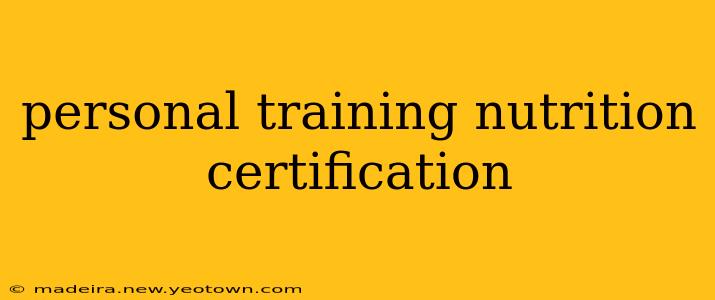So, you're a passionate personal trainer, helping clients sculpt their dream bodies and achieve peak fitness. But you feel like something's missing. You want to provide holistic support, guiding clients not just through workouts, but also through the crucial aspect of nutrition. That's where a personal training nutrition certification comes in. This isn't just about adding another line to your resume; it's about transforming your career and profoundly impacting your clients' lives. Let's dive into the world of personal training nutrition certifications and unravel what makes them so invaluable.
Why Get a Personal Training Nutrition Certification?
Imagine this: you're working with a client who's diligently following your workout plan, but their progress is plateauing. Why? Often, it's because their diet isn't supporting their fitness goals. A nutrition certification empowers you to address this critical piece of the puzzle. You'll move beyond simply recommending "eat healthy" and instead provide tailored, science-backed nutritional guidance specific to each client's needs and objectives. This translates to faster results, increased client satisfaction, and ultimately, a more successful and rewarding career for you.
What Does a Personal Training Nutrition Certification Cover?
A comprehensive program will delve into various aspects of nutrition, equipping you with the knowledge to design effective nutrition plans. Expect to learn about:
- Macronutrients and Micronutrients: Understanding carbohydrates, proteins, fats, vitamins, and minerals and their roles in the body.
- Calorie Counting and Macronutrient Ratios: Mastering the science behind calorie balance and tailoring macronutrient ratios for different fitness goals (weight loss, muscle gain, maintenance).
- Meal Planning and Timing: Creating practical and delicious meal plans that align with clients' lifestyles and preferences.
- Dietary Supplements: Learning about popular supplements, their benefits, potential risks, and responsible usage.
- Client Communication and Counseling: Developing effective communication skills to educate and motivate clients about nutrition.
- Understanding Specific Dietary Needs: Accommodating clients with allergies, intolerances, or specific dietary requirements (vegetarian, vegan, etc.).
- Legal and Ethical Considerations: Navigating the legal landscape and ethical responsibilities when providing nutrition advice.
What are the Different Types of Personal Training Nutrition Certifications?
The market offers a plethora of certifications, each with its own approach and focus. Choosing the right one is crucial. Consider factors like:
- Accreditation: Opt for certifications from reputable organizations recognized within the fitness industry.
- Curriculum: Ensure the program covers the essential topics mentioned above and aligns with your learning style.
- Cost and Duration: Balance the investment with the value and the time you can commit to the program.
- Continuing Education: Check if the certification organization provides opportunities for ongoing professional development.
Is a Personal Training Nutrition Certification Worth the Investment?
Absolutely! The return on investment is significant. A personal training nutrition certification allows you to:
- Command Higher Fees: Offer more comprehensive services and charge accordingly.
- Attract More Clients: Become a more sought-after trainer with specialized expertise.
- Increase Client Retention: Deliver superior results, fostering stronger client relationships and loyalty.
- Boost Your Career Satisfaction: Experience greater fulfillment by helping clients achieve holistic well-being.
How Much Does a Personal Training Nutrition Certification Cost?
The cost varies widely depending on the program and organization. Expect to invest anywhere from a few hundred to several thousand dollars. Research thoroughly and compare different options before making a decision. The investment is worthwhile, considering the potential long-term benefits.
What are the Best Personal Training Nutrition Certifications?
Numerous reputable organizations offer excellent personal training nutrition certifications. Thorough research is key to finding the right fit for your needs and goals. Look at reviews, curriculum details, and instructor qualifications before making your choice.
How Long Does it Take to Get Certified?
The duration varies depending on the program. Some programs can be completed in a few weeks, while others might take several months.
Can I Become a Registered Dietitian with a Personal Training Nutrition Certification?
No, a personal training nutrition certification does not qualify you as a Registered Dietitian (RD) or Registered Dietitian Nutritionist (RDN). These titles require a specific educational pathway, including a bachelor's degree in nutrition and a supervised internship. However, a personal training nutrition certification provides valuable supplementary knowledge for fitness professionals.
In conclusion, a personal training nutrition certification is a transformative investment. It elevates your expertise, expands your service offerings, and ultimately leads to a more fulfilling and successful career in the fitness industry. It's about more than just adding a credential; it's about empowering yourself to become a true holistic wellness coach, profoundly impacting the lives of your clients. So, take the leap – your clients, and your career, will thank you for it.

